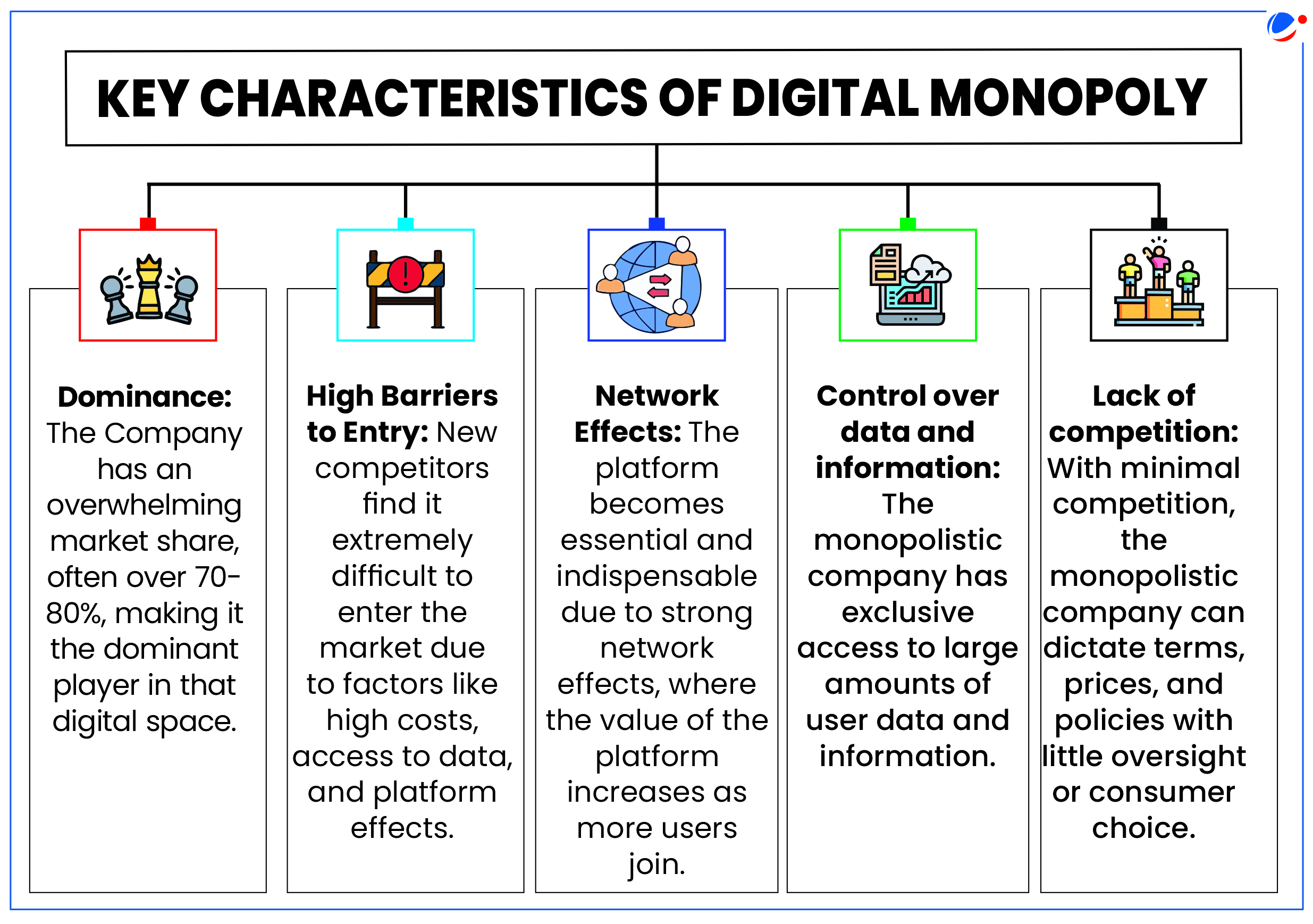Why in the news?
The Ministry of Electronics and Information Technology (MeitY) has expressed strong opposition to Google's delisting of certain applications from the Play Store.
More about the news
- Issue: Google's parent company Alphabet Inc. sent a notice to 10 companies for the non-payment of Google app marketplace fee to the big tech company.
- Google's Decision: Subsequently, some of these apps were removed (delisted) from the Play Store, sparking a showdown between Google and the parent companies of these apps.
- Government Response: MeitY said it will not permit the de-listing of apps, flagging the concerns around abuse and misuse of dominant position by Google and creating digital monopolies.
What is Digital Monopoly?
- Digital Monopoly: Refers to a situation where a single company or platform holds significant control over their respective digital ecosystems and markets.
- Examples: Big tech companies like Google, Amazon, Facebook, Apple, and Microsoft.

What are the threats posed by digital monopolies?
Digital monopolies can engage in Anti-Competitive Practices ("the ACPs"), affecting competition in the market and subsequently overall consumer choice and well-being. Following are some of the major anti-competitive practices-
- Anti-steering: Exclusionary behavior that hinders business users and consumers from switching to third-party service providers. E.g., App stores mandating use of their own payments systems.
- Platform neutrality / Self-preferencing: A digital enterprise according favorable treatment to its own products on its own platform, thus creating a conflict of interest.
- Adjacency / Bundling and tying: Combining or bundling core or essential services with complementary offerings, thus forcing users to buy related services.
- Data usage: Using personal data for consumer profiling to offer targeted online services and products, thus raising data privacy concerns.
- Pricing / Deep discounting: Predatory pricing strategies, or intentionally setting prices below cost price to exclude competitors.
- Exclusive tie-ups: Exclusive agreements with business users or sellers, thus preventing them from dealing with other enterprises. E.g., Apple restricts installation of third-party applications on iPhones.
Regulation of Digital Ecosystem in India
- Competition Act, 2002: It aims to promote and sustain competition in markets and protect the interests of consumers among others. The Competition Act follows two approaches to regulation-
- Ex-post approach where anti-competitive agreements and abuse of dominance are scrutinised after such contraventions have occurred.
- Ex-ante approach where parties intending to enter into a combination are required to notify and seek approval from the CCI before consummation of the transaction.
- Information Technology Act, 2000: It is the primary legislation in India that governs various aspects of the digital ecosystem.
- However, it was enacted in the inception period of the Internet and may not address contemporary challenges.
- Sector-Specific Rules: The government issues regulations for specific sectors like social media (IT Rules) and e-commerce (Consumer Protection Rules) to address emerging issues. E.g.,
- Information Technology (Intermediary Guidelines and Digital Media Ethics Code) Rules, 2021 was introduced to regulate digital media and over-the-top (OTT) platforms.
Need for Reforms in the Regulation of Digital Ecosystem in India
- Regulatory Fragmentation: Digital ecosystem in India is governed by multiple regulatory bodies and agencies, thus hindering the effectiveness of overall digital regulation.
- Regulatory Bodies Face Constraints: Such as technical expertise, data analysis capabilities, resources etc. to effectively monitor and address complex issues in the digital ecosystem.
- Balancing Innovation and Regulation: Overly restrictive regulations can stifle the growth of the digital ecosystem, while lax regulations can lead to the development of monopolies.
- Implementation Challenges: As digital companies often operate across jurisdictions and can quickly adapt their practices to circumvent regulations.
India's Initiatives to Prevent Digital Monopolies
- Consumer Protection (E-Commerce) Rules, 2020: Introduced to govern the operations of e-commerce platforms and digital marketplaces. These rules aim to prevent anti-competitive practices, ensure transparency, and protect consumer interests.
- Competition (Amendment) Act, 2023: Introduced new merger notification thresholds and deal value thresholds to capture acquisitions of high-value, data-rich firms that can potentially lead to digital monopolies.
- Competition Commission of India (CCI) also investigates and takes action against anti-competitive practices by digital platforms.
- Digital Personal Data Protection Act 2023: It emphasizes the importance of data to prevent the concentration of data in the hands of a few dominant players.
- Proposed Digital India Act (DIA): The DIA proposes to regulate a vast array of digital enterprises including social media websites, artificial intelligence-based platforms, and e-commerce enterprises.
- Draft National Data Governance Framework Policy: It aims to create standardized data management and security for non-personal and anonymised data across all government bodies.
Way Forward (Recommendations of the Committee on Digital Competition Law, 2024)
- Introduction of a Digital Competition Act with ex-ante measures (using a form of financial analysis that uses forecasting for future events as against the prevailing practice of ex-post framework in most cases).
- Systemically Important Digital Intermediaries' (SIDIs): Identification and designation of certain large digital platforms as SIDIs. They would be subject to ex-ante regulations and obligations.
- Merger Control Reforms: Introduction of a deal value threshold and the consideration of non-price factors like data and innovation in merger assessments.
- Strengthening the Competition Commission of India (CCI): Enhancing the institutional capacity and expertise of the CCI to effectively deal with competition issues in the digital domain.
- Better coordination among various regulatory authorities, such as the CCI, the Telecom Regulatory Authority of India (TRAI) etc.
- Increased international cooperation and alignment with global best practices in digital competition regulation.







